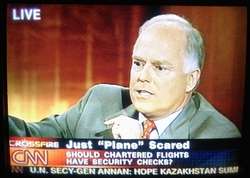Better to Include Experts, Rather Than Just Bureaucrats,
Decide
 National Air Transportation Association president
James K. Coyne is happy about the formation of a general aviation
security working group within the federal government. The group,
tentatively referred to as the General Aviation Airports Security
Working Group (GAASWG), was created by the Transportation Security
Administration's (TSA) Aviation Security Advisory Council (ASAC).
The ASAC also established three separate working groups to discuss
the various security concerns confronting air cargo operators.
National Air Transportation Association president
James K. Coyne is happy about the formation of a general aviation
security working group within the federal government. The group,
tentatively referred to as the General Aviation Airports Security
Working Group (GAASWG), was created by the Transportation Security
Administration's (TSA) Aviation Security Advisory Council (ASAC).
The ASAC also established three separate working groups to discuss
the various security concerns confronting air cargo operators.
As a longstanding member of the ASAC, NATA supported proposals
to establish the working groups as an appropriate method of
developing security recommendations for these important segments of
the air transportation system. NATA, along with other major general
aviation trade associations, will participate in the airports
security working group's efforts and is also a member of the air
cargo panels. Appropriate federal and state agencies are also
represented.
 "The General Aviation Airports Security Working
Group will be an important forum for addressing any lingering
concerns regarding the security of these aircraft operators and the
businesses who serve them," stated Coyne (right). "Most critical,
however, will be our industry's efforts to demonstrate to the
Transportation Security Administration and other government
agencies that general aviation airports are already more secure
than before September 2001."
"The General Aviation Airports Security Working
Group will be an important forum for addressing any lingering
concerns regarding the security of these aircraft operators and the
businesses who serve them," stated Coyne (right). "Most critical,
however, will be our industry's efforts to demonstrate to the
Transportation Security Administration and other government
agencies that general aviation airports are already more secure
than before September 2001."
In a presentation to the ASAC, TSA representatives identified
several tasks for the general aviation working group to accomplish.
These include developing a work plan; developing standards to
categorize general aviation airports, both public and private; and
creating security "best practices" as appropriate for these
categories. Significantly, the TSA noted that all recommendations
will be based on analysis of the threats they are designed to
mitigate and that no new regulations for the industry are planned.
Instead, according to Coyne, the TSA's intent is to develop a
series of recommendations and guidelines that airport operators
throughout the U.S. may implement.
"It is crucial for industry that any final recommendations
coming out of this working group are developed using honest threat
analyses as an overriding concern," said Coyne. "With a continuing
public focus on all aspects of aviation security," he added, "we
are encouraged that government and industry will finally sit down
to decide upon appropriate security procedures for general aviation
facilities.
 "Of course of over-riding concern to the
association is prevention of the inappropriate application of
airline hub-type security to the general aviation airport. Our
recommendations must be flexible and geared towards the unique
characteristics of general aviation airports," Coyne explained.
"Of course of over-riding concern to the
association is prevention of the inappropriate application of
airline hub-type security to the general aviation airport. Our
recommendations must be flexible and geared towards the unique
characteristics of general aviation airports," Coyne explained.
Similarly, the air cargo working groups will be meeting to
decide what, if any, steps may be appropriate to enhance this
industry segment's security. While much of the groups' focus will
be on the security of cargo aboard larger or passenger-carrying
aircraft, smaller on-demand charter operators who fly cargo will
also participate. Michael Grossmann, president of Castle Aviation,
a charter cargo operator based in North Canton (OH), will help NATA
on these working groups. Mike is a longstanding active member of
the NATA Air Charter Committee and is the current Chairman of the
Air Cargo Subcommittee.
"We are very pleased to have someone of Mike's stature give so
freely of his time away from his Ohio-based business to participate
in these efforts," Coyne said. "We look forward to drawing upon his
real-world experience as an on-demand charter operator while this
industry wrestles with the challenges posed in these working
groups."
 ANN's Daily Aero-Term (05.01.24): Say Altitude
ANN's Daily Aero-Term (05.01.24): Say Altitude ANN's Daily Aero-Linx (05.01.24)
ANN's Daily Aero-Linx (05.01.24) Classic Aero-TV: Korean War Hero Twice Reborn
Classic Aero-TV: Korean War Hero Twice Reborn Airborne 04.29.24: EAA B-25 Rides, Textron 2024, G700 Deliveries
Airborne 04.29.24: EAA B-25 Rides, Textron 2024, G700 Deliveries Airborne Affordable Flyers 05.02.24: Bobby Bailey, SPRG Report Cards, Skydive!
Airborne Affordable Flyers 05.02.24: Bobby Bailey, SPRG Report Cards, Skydive!





